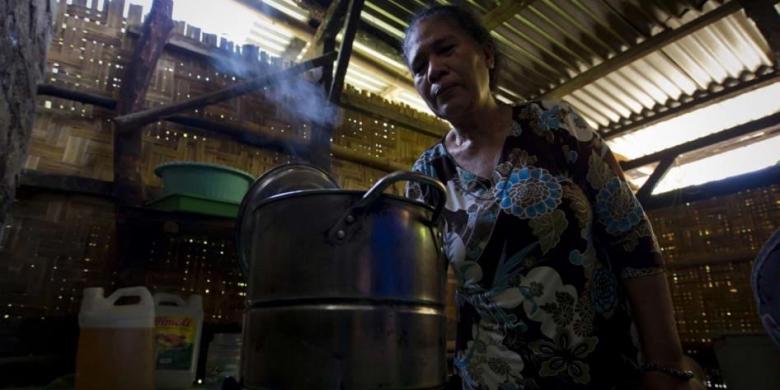
Elisabeth Hadi Rendi memasak air menggunakan kompor yang didukung oleh gas metana yang dihasilkan sistem biogas mini dari kotoran babi di Waingapu, Sumba, 20 Maret 2014.
KOMPAS.com, JAKARTA – “Now I don’t buy LPG anymore for my daily cooking needs. I and other inhabitants have our own source of flame to cook, and turn on the light at home,” uttered Sriyatun.
The 35 year old lady is a livestock breeder family member and one of the domestic biogas (BIRU) user from Lembu Village, Bancak, Semarang. There are 96 biogas reactors in Lembu Village which leads it to fetch the title Energy Self-Reliance Village at the Central Java provincial level in 2014.
Family members of Indonesian livestock breeders who have used BIRU now do not have to worry anymore with price volatility of conventional fuel as their gas needs have been fulfilled, directly from their own livestock stables.
Sriyatun and Lembu Village are part of the 70,000 Indonesians who have enjoyed the benefits of 14,173 BIRU reactors which had been constructed up to 3 February 2015. BIRU is a joint program among Hivos, SNV, and Yayasan Rumah Energi, under the coordination of the Directorate General of New and Renewable Energy and Energy Conservation (DJEBTKE) of the Ministry of Energy and Mineral Resources of the Republic of Indonesia.
The collaboration is established to encouarge potential local administratives in BIRU development in their respective territories. The program which was actually initiated in 2009 by the Embassy of Netherland, embraces local organizations as partners to build and promote the form of renewable energy which is modern and sustainable for the people of Indonesia.
With the support of the Embassy of Norway and EnDev (Energizing Development) program. BIRU program at the moment works in 9 provinces in Indonesia namely: Lampung, West Java, Central Java, DI Yogyakarta, East Java, Bali, West Nusa Tenggara, and East Nusa Tenggara (Sumba), and aim for the expansion of operational territories of a minimum of four provinces in 2015.
Diminishing odor
Other than the benefit of affordable energy, out of 2013 survey results, BIRU users said that the surrounding of their homes have been healthier. According to them, the smoke in their kitchens are less (79 percent), kitchens are cleaner (72 percent), and the livestock stables are cleaner (69 percent).
“The unpleasant odors have been reduced down to 75 to 80 percents. No more protest from the surrounding neighbors. We are satisfied with BIRU,” uttered Abas (54), a meat poultry farmer from Sodo Hamlet, Sodo, Pakel, Tulungagung, East Java.
Abas started his poultry farming business since 1999 with a population of 1,000-2,000 birds. Prior to using BIRU biogas, his business have been protested due to the unpleasant odor radiated by the poultry farming which causes nuisance to the surrounding community.
Other benefit of the biogas is the waste (bio-slurry) which is potential in reducing the carbon between 2-7 tons of CO2 per hectare annually. This is supported by the preliminary report produced by Soil and More International in the role of feasibility study of biogas waste in supporting Climate Smart Agriculture in Indonesia.
Bio-slurry, both liquid and solid, is a very good organic fertilizer which fertilize the soil and improve the crop production. Several BIRU users have even turned the biogas waste as a mixture with their vermicompost fertilizer, bokashi fertilizer, mushroom culture media, pond fertilizer, as well as fish and eels feedstuff, with a satisfactory result.
BIRU Program has been officially registered in Gold Standard credit carbon scheme since 2013 and receive acknowledgment that each reactor installed is estimated to be able to reduce the emission approximately 3 tons of CO2 annually.
According to the Executive Director of Yayasan Rumah Energi, Line Meutia Moeis, BIRU program has improved the potential of biogas sector for further development and generating plenty of benefits for livestock breeder, farmer, and people of Indonesia.
“Along with 50 partner organizations and more than 1,200 trained masons, are committed to consistently promote the renewable energy to bring high quality clean energy into reality and is easily accessible by the people of Indonesia,” Lina uttered in a written statement to Kompas.com, Friday (February 6, 2015).


